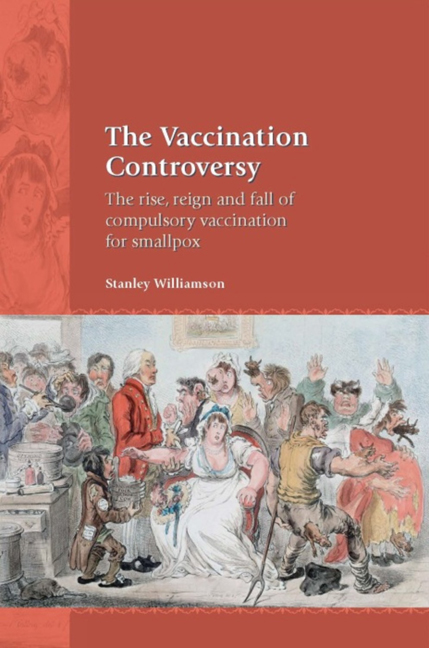Book contents
- Frontmatter
- Dedication
- Epigraph
- Contents
- Acknowledgements
- Part I The Road to Compulsion
- Part II The Reign of Compulsion
- 14 A Loathsome Virus
- 15 A Cruel and Degrading Imposture
- 16 Ten Shillings or Seven Days
- 17 Death by Non-Vaccination
- 18 The Great Pox
- Part III The Retreat from Compulsion
- Notes
- Bibliography
- Index
14 - A Loathsome Virus
from Part II - The Reign of Compulsion
- Frontmatter
- Dedication
- Epigraph
- Contents
- Acknowledgements
- Part I The Road to Compulsion
- Part II The Reign of Compulsion
- 14 A Loathsome Virus
- 15 A Cruel and Degrading Imposture
- 16 Ten Shillings or Seven Days
- 17 Death by Non-Vaccination
- 18 The Great Pox
- Part III The Retreat from Compulsion
- Notes
- Bibliography
- Index
Summary
As has been noted, condemnation of compulsory vaccination dates from shortly after the passage of the Act of 1853, with the letter from John Gibbs to the President of the Board of Health. Born in Ireland in 1811, Gibbs was described by an acquaintance as ‘sagacious, bright, earnest and independent’, with a passion for ‘such things as made for human welfare and improvement’. He became interested in hydro - pathy and in particular in its use in cases of smallpox. In later life he made his home in St Leonards, in Sussex. His influential letter to the Board of Health was based on a pamphlet that he had published in 1854 under the title ‘Our Medical Liberties’.
‘The partisans of compulsory vaccination,’ he wrote, ‘cast away every gentlemanly feeling, disregard every principle of justice, violate the spirit of freedom, outrage the precepts of Christianity, trample upon common sense, betray their own rights and dearest interests.’ After this comprehensive denunciation he took each item in turn and expanded it, occasionally in the repetitive fashion that became one of the continuing characteristics and weaknesses of the whole long campaign.
The compulsory Vaccination Act, he asserted, was the first direct aggression upon the person of the subject in medical matters which has been attempted in these kingdoms. It invades in the most unexampled manner the liberty of the subject and the sanctity of the home […] it sets at nought parental responsibility and constrains the parent either to violate his deliberate convictions, and even his religious scruples, or to defy an unjust law.
Why was vaccination held in horror by so many parents and others?
They do not believe that it affords an efficient and assured protection against the invasion of small-pox: they have a natural disgust of transferring to the veins of their children a loathsome virus derived from the blood of a diseased brute and transmitted through they know not how many unhealthy mediums [i.e. by the arm-to-arm method]: they have a dread, a conviction, that other filthy diseases, tending to embitter and shorten life, are frequently transmitted through and by the vaccine virus [a reference to the dread of syphilis] […] and further they have a conscientious conviction that voluntarily to propagate disease is to fly in the face of God and to violate that precept which says ‘Do thyself no harm’.
- Type
- Chapter
- Information
- The Vaccination ControversyThe Rise, Reign and Fall of Compulsory Vaccination for Smallpox, pp. 179 - 187Publisher: Liverpool University PressPrint publication year: 2007



